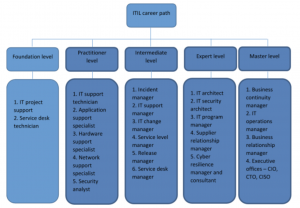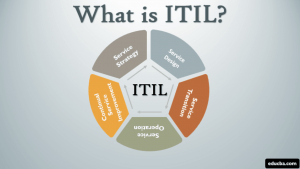
All over the world, embracing ITIL is the current industry trend. In fact, in an AXELOS survey titled ‘The Importance of ITIL’ conducted in 2014, 52% of respondents in the APAC region and 68% of respondents in Latin America said that ITIL is becoming more important due to the latest trends in Cloud and Agile. Let us explore how enterprises around the world can rely on ITIL-certified employees to streamline service management as well as aid smooth transition during business change.
What is ITIL?
ITIL is an acronym for Information Technology Information Library. ITIL is defined as a set of best practices for providing effective IT support services. It regulates the selection phase, planning phase, delivery, and maintenance of IT services within the organization. It also helps to attain predictable levels of service. ITSM helps the business to accomplish its project mission and vision with people, technology, and process.
ITIL processes are used for improving the IT service lifecycle. The process also helps to boost the capabilities of organizations’ processes and people ensuring to stay on top of the competition.
Core Concepts of ITIL
Here are 5 key concepts of ITIL:
- Delivering maximum value to customers
- Optimizing resources and capabilities
- Offering useful and reliable services
- Defining roles clearly for each task
- Planning processes with specific goals in mind
What is the ITIL Framework?
According to AXELOS, ITIL is the most widely adopted framework for IT Service Management (ITSM) in the world. It is a practical and no-nonsense approach to the identification, planning, delivery, and support of IT services which has revolutionized ITSM. Today, thousands of organizations around the world implement ITIL best practices in their work environments.
ITIL provides the basis for quality ITSM through documented, proven processes that cover the entire Service Lifecycle. It is easy for organizations to learn, improvise and implement the framework to suit their environment.
ITIL framework comprises five phases of the service lifecycle. Each phase in the lifecycle comprises a set of functions and processes aligned with the organizational structure.
The ITIL framework is classified into 5 categories:
- Service Strategy
- Service Design
- Service Transition
- Service Operation
- Continual Service Improvement
what is ITIL -Invensis Learning
Service Strategy
This phase should synchronize with the business objectives. It helps to align your IT department with the core business processes and define business requirements as well. The utility and warranty of this phase is mainly designed to make sure that the service fits its purpose and use.
Service Design
The service design phase mainly targets the design of services such as processes, policies, documentation, and architectures. The four P’s of service design to be considered in this phase include:
- People- Human resources are required to support the services.
- Processes- Service management processes are essential to support the service.
- Products- Technology assistance is required to support the service.
- Partners- The third parties provide added support to the services.
Service Transition
The service transition phase mainly focuses on the existing condition of the service whilst implementing new changes. This phase also ensures that risk and its impact are in control so that there are no hindrances to the existing services.
Service Operation
The service operation phase delivers services to targeted customers. This stage mainly focuses on catering to the user requirements while handling the costs and any issues that would arise. The processes include resolving service failures, fulfilling user requests, and fixing issues.
Continual Service Improvement
An effective ITSM project is merely not about completing the project, it’s about preparing for continuous improvements in an incremental approach. The continuous assessment process just only eliminates the existing problems but makes it much better to adhere to customer requirements.
Going thoroughly through the above phases will help the organization assess where it stands back. Do they need to revamp their existing strategies? Identify the reason for failure, trace the phase at which it occurs and try to resolve the issue using the guidance of that particular phase.
This will improve the capability of the organization to satisfy the customers’ requirements efficiently providing the best quality IT services.
Knowledge of ITIL is Divided Between Five Levels of Qualifications or Certifications:
- ITIL Foundation Certification
- ITIL Intermediate – Service Lifecycle stream and Service Capability stream
- ITIL Managing Across the Life Cycle
- ITIL Expert Level
- ITIL Master
If you are considering ITIL certification, here are a few potential career paths for you

Considering how an ITIL certification course will support your career path and increase your potential earnings, the course is undeniably a worthwhile investment.
The ITIL framework currently provides four levels of ITIL certification:
1st level
The first level is the ITIL Foundation Certification. It focuses on the standard methodology and terminology associated with ITIL services. If you take up this course you will gain knowledge of the basics of ITIL and can implement it at your workplace. You can also extend support to and deliver ITIL services.
2nd level
The second level is the Practitioner Certification. It provides a practical approach to ITIL and is available to all those who qualify in the ITIL Foundation course. You will learn the “how to”, “what”, and “why” of ITIL in this course. You will also gain competencies in communication and organizational change management.
3rd level
The third level is Intermediate Certification. It comprises two categories of certification: service lifecycle and service capability. You must earn a total of 22 credits to move towards the ITIL expert level.
4th level
The 4th level is the Expert Certification. Those who have cleared the Foundation, Practitioner, and Intermediate levels are eligible to take this course.
Organizations implement the ITIL framework for their IT infrastructure, mainly for its best practices and how it brings overall value to the organization’s goals and objectives. With ITIL guidance, organizations have a common vocabulary for ITSM.
Many world-renowned companies have adopted ITIL as part of their IT service management objectives and have adapted the framework to suit their unique requirements. For instance, according to the AXELOS case study ‘Disney’s ITIL Journey’*, The Walt Disney Company started to adopt Information Technology Infrastructure Library (ITIL) best practices in the mid-2000s. Post-2008, the company felt a need to move towards a more integrated approach to service management and become a more proactive IT organization. This requirement was particularly felt in the Theme Parks & Resorts division, which endeavors to provide a perfect experience to its millions of guests all across the world. One of the ways Disney got around 250 of its domestic IT staff on board for the shift in thinking and practice for ITIL integration, was to impart ITIL Foundation training in a condensed, relevant package.
10 Benefits of Having ITIL Certified Employees for Organizations
Organizations who have employed ITIL-certified employees around the world are getting numerous benefits, including:
- Improved perception of IT within the business perception of IT improves when organizations feel that they can count on their IT infrastructure to deliver what the business wants. When ITIL-certified employees implement the ITIL framework, it provides processes to identify, prioritize, and manage service improvement opportunities for IT service management which will help to improve the business.
- Improves business capability:
ITIL-certified professionals within an organization understand and share a common language for ITSM. So, there are no more lapses in deliverables, which allows organizations to improve their business capability. - Builds trust within the organization:
ITIL-certified managers understand the importance of building a trusted network among stakeholders, ensuring that everybody is on the same page, and carrying out seamless operations while delivering expected outputs. - Improves efficiency:
ITIL-certified managers can automate standard tasks and apply best practice principles to ITSM processes. They can also improve efficiency by developing metrics for the processes and tasks. - Reduced IT security exposures:
IT security incidents directly impact business revenue and threaten an organization’s reputation. With knowledge of IT security management, ITIL-certified employees can deploy processes that help in reducing exposure to IT security threats. - Brings good change management:
ITIL-certified professionals have a thorough understanding of the ITIL framework and can lay down clear communication channels for release schedules, which help in introducing new and changed IT services. The risks of change are now well planned and managed in a timely fashion to ensure minimal disruption to the business. - Better resource utilization:
Managing demand for resources requires an understanding of business priorities. An ITIL-certified manager can help in identifying where resources can be utilized for the best results. - Financial control
ITIL certified manager will ensure funds are available for planned events. This fosters an environment of control to make sure IT services are used effectively and efficiently. - Minimizes disruption in IT services:
Any disruption or significant business outage is detrimental to an organization. ITIL-certified professionals can ensure alternate service options are in place to mitigate the impact of business outages due for various reasons. - Support cloud models:
Gartner predicts that 50% of enterprises around the world will use hybrid cloud deployments by 2017. ITIL certified managers will be capable of applying ITIL best practices to cloud deployment, for the organization to get maximum ROI from this technology paradigm.
As seen in the above-mentioned benefits, enterprises around the world can rely on ITIL-certified employees to streamline service management as well as aid smooth transitions during business change. With enterprise workforce development programs in place for their ITSM managers to certify them in ITIL, the best practice guidance, and the skills of employees can be upgraded for the betterment of the individual, and the business.















